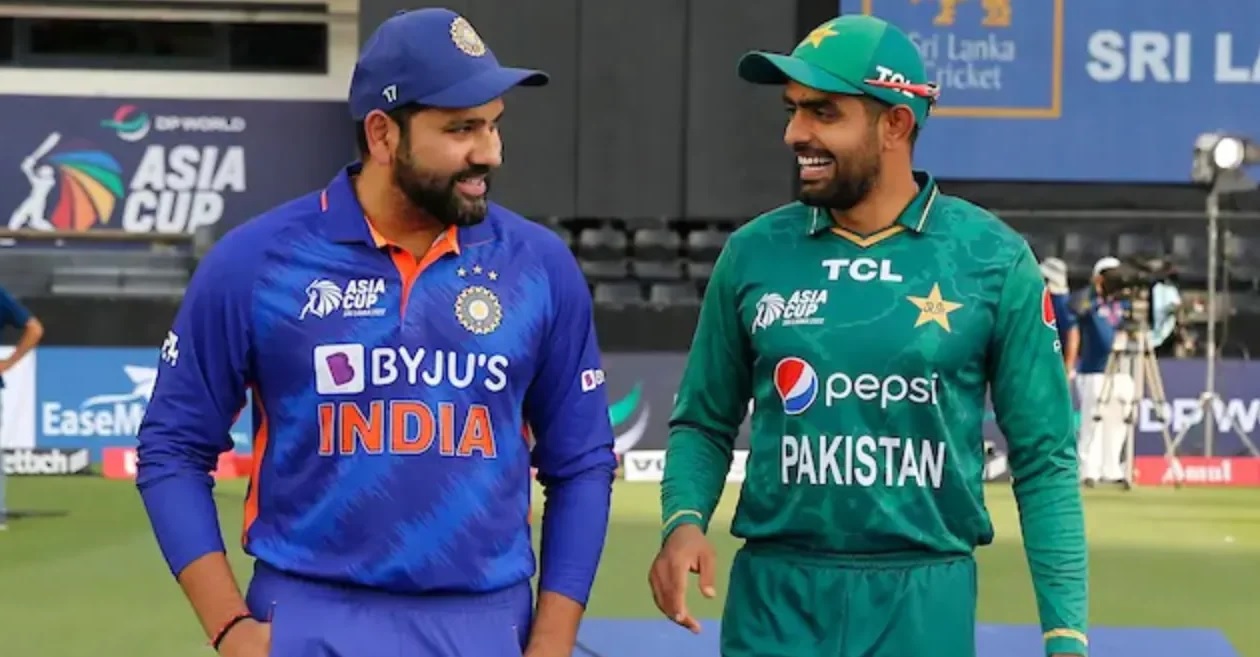
Rohit Sharma, Babar Azam (Photo Source: Twitter)
When India and Pakistan play each other in One-day Internationals, two sets of numbers are thrown around for bragging rights.
One is the overall head-to-head, where Pakistan lead 73 to 56 giving the men in green hope despite a poor record in recent times (they have lost 11 of the 16 matches vs India since 2010); the other is the World Cup head-to-head where India lead 7-0, having won all their duels since the 1992 edition convincingly.
But what is often ignored is that Pakistan have had the better of India in India winning 19 of the 30 matches, with the latest success coming in the last bilateral series between the two in 2012-13 which the men from across the border won 2-1.
In fact, India is the only venue besides United Arab Emirates (read Sharjah) where Pakistan have dominated India in ODIs.
So when the two teams, whose ODI rivalry is into its 46th year, face each other at the Narendra Modi Stadium in Ahmedabad for their third game of this World Cup, it will be risky to trust only India’s strength on paper and dominant record over Pakistan since 2010.
India vs Pakistan is a different battle where handling of pressure often decides the outcome of the game.
Former India left-arm spinner Maninder Singh, who has featured in many duels with Pakistan in the 1980s in Sharjah and the sub-continent, says, “Due to the traditional rivalry, the pressure will always be there. The relations between the two countries are like that.”
Maninder played against Pakistan when they comprised superstars, including some of their greatest cricketers.
He says that most of the pressure came from outside during his playing days.
“Discussions [ahead of the match] were normal. There was nothing special for Pakistan. But we used to hear one thing from fans, especially in Sharjah, don’t lose to them. But I can tell you when I used to go on the ground, I would forget that,” he adds.
A reason for fans’ desperation was that those living in Sharjah were expatriates and were in constant touch with Pakistani expatriates. A loss would be discussed the next day at work and would be embarrassing.
However, things have changed since the days of Sharjah. While India have become top-notch team and are run by the richest and most powerful cricket board in the world, Pakistan have struggled to develop superstars with their main strength, bowling, struggling in recent times and even becoming a liability on many occasions. Their only wins over India in ICC tournaments – in 2017 Champions Trophy final and 2021 T20 World Cup league stage – were built on batsmen’s success.
Former India all-rounder Manoj Prabhakar, who featured in the 1992 World Cup duel and was part of the 1996 World Cup squad, says that Pakistan’s bowling always had the edge wherever pitches were flat since they could use the reverse swing.
“We would move the ball off the pitch but the flat pitches in Sharjah would render our swing ineffective. They would use reverse swing on those flat surfaces. However, once they’d move out of that comfort zone (of flat pitches) their batsmen would struggle,” he said.
This explains why Pakistan have struggled to beat India in neutral, non-Sharjah, venues.
Prabhakar also says that the pressure is generally built by those outside, especially “the media”.
“We never did any extra preparation ahead of the game against Pakistan. It was usual.”
However, since this is a match in India, and Pakistan are coming on a high having chased the highest World Cup target against Sri Lanka on a flat lifeless Hyderabad pitch, there are reasons to worry for Rohit Sharma’s men, despite them beating Afghanistan comfortably and fighting to beat Australia.
Another flat pitch may bring Pakistan in the game especially if Shaheen Afridi can overcome his recent poor form and strike early.
It would be more ideal for India to have a spin-friendly track, which is what is likely to happen if the speculation coming through is correct.
Pakistan batsmen are known to struggle against wrist-spin and Mohammad Rizwan gave a hint of the threat his camp is expecting through an extended practice session on Thursday, where he kept sweeping a local Chinaman bowler in preparation of Kuldeep Yadav.
Yadav has had the better of Pakistan captain and batting mainstay Babar Azam, who struggles against wrist spin like most of the current generation of Pakistan batsmen.
R Ashwin may get the nod considering Pakistan have a few left-handers, while all-rounder Ravindra Jadeja, a left-arm spinner and batsman will likely keep his place. This will mean a three-pronged spin attack which appears much superior to Pakistan’s based on current form and experience.
Both Prabhakar and Maninder are of the opinion that Indians have the wherewithal to put the game beyond Pakistan this time too.
“India have 5-6 match-winners unlike most other good teams, who have at the most three match-winners. They never let the other teammate get under pressure,” says Prabhakar.
Maninder concurs.
“Most of these boys revel in pressure. Every player handled the situation well like against Australia when India were three down for two runs and still won. There are many such examples in recent times. These boys are smart cricketers,” he adds.
However, as Prabhakar puts in a note of caution, “It is cricket and anything can happen on the day.”
At the India AI Impact Summit 2026, visiting presidents from France, Sri Lanka and Brazil…
According to the Central Pollution Control Board's (CPCB) Sameer app, 19 stations were in the…
AQI rises to 208, slipping into ‘poor’ category, according to the Central Pollution Control Board
Dilli 6 – Ishq-e-Dilli at Edesia presents a carefully sequenced journey through familiar flavours from…
Two youth arrested for killing a 55-year-old woman during a robbery in Jyoti Nagar; stolen…
Scheme aims to provide affordable meals to over 1 lakh people daily, with each canteen…